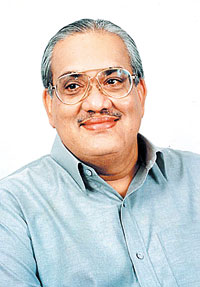Sunday Times 2
Run-up to Speaker Anura Bandaranaike’ historic ruling in June 2001
View(s):By Nihal Seneviratne
Anura Bandaranaike was elected Speaker of Parliament in 2001. Soon after, I received two messages from him, conveyed by a mutual close friend, requesting that I work for him as his advisor. I told the friend that I regret very much that I cannot undertake this position because, having been closely associated with Parliament for over 30 years, it would be incorrect and unethical for me to return to Parliament and work in that capacity. A few days later, I received three calls from Mr. Bandaranaike himself, insisting that I come to work for him, and as he himself insisted, I found it extremely difficult to refuse him as I had become, over the years, a close friend of his.

Anura Bandaranaike
Since there was no position in the cadre of Parliament, he arranged with his mother, Prime Minister Sirimavo Bandaranaike, to have a Cabinet paper presented to the Cabinet. After this was agreed to, he insisted that I start working with him, which I did. I told him I was a complete teetotaler and that I had been informally told by his personal physician, Dr. H.H.R. Samarasinghe, that since his health condition was not good, he should stay away from alcoholic beverages as long as I worked with him, and he readily agreed.
So many were the occasions he invited me to his elegant apartment at Rosmead Place, designed by Geoffrey Bawa, to have lunch with him. He was the perfect raconteur, and we avidly spoke of his knowledge of films, art, sculpture, and architecture, which I enjoyed very much.
It was then that I sought his permission to go to Singapore with my family for 10 days, which he readily agreed to.
When I was in Singapore, I was contacted by our High Commissioner and told that the Speaker had insisted that I return to Sri Lanka immediately. Since this seemed to be an urgent request, I cut short my stay and returned home.
The very next day, I called on him, and he said he was facing a huge problem: A three-judge Supreme Court bench had issued a Stay Order restraining him from appointing a Select Committee to inquire into the conduct of the Chief Justice consequent to the Motion of Impeachment against him.
He was very concerned and worried and asked me to get an appointment with his close friend and eminent lawyer, H.L. de Silva. Having got this almost overnight, both he and I proceeded to Mr. de Silva’s house, and we had a four-hour discussion with him. He said he would study the matter closely and give his opinion on it. This he did in a week.
Both the Speaker and I spent the next few days discussing the pros and cons and how we should act in this matter. By this time, I had done the work in our Parliament, collected all the rulings given by Speakers both in Sri Lanka and the UK, and studied very closely the Standing Orders of Parliament, the Powers and Privileges Act of 1953, the authorities set out in Erskine May, which we regard as a book of Parliamentary studies and the note provided by Mr. H.L. de Silva, which we found so useful. Having together studied all these authorities and had numerous discussions over the next few days, he wanted me to prepare a draft ruling, which I did.
Over the next few days, we discussed the draft, and accordingly, he made some significant changes. After much deliberation, thought, and discussion, we prepared the final ruling, which he gave to the House on June 20, 2001.
This ruling was widely accepted by the House, both by the government and opposition members. Parliamentarians from both sides widely acclaimed his ruling and congratulated him in person. Mr. Bandaranaike was very happy that his ruling was so widely accepted that he wanted me to get it printed, which I did with a nice photo of him in ceremonial attire on the front page, and he wanted me to send it to different Parliaments both in the Commonwealth and outside. Today, this ruling has come to be widely accepted in Sri Lanka and has a very special position as a landmark judgement.
I was very personally gratified by his act of signing a printed copy, which I still treasure, and in his own handwriting, adding the words, “Dear Nihal, if not for you, this piece of history would not have been possible. Much affection. Signed by him: Anura, 25.6.2001.
(The writer served as advisor to Speaker Anura Bandaranaike. He is also a former Secretary General of Parliament)

